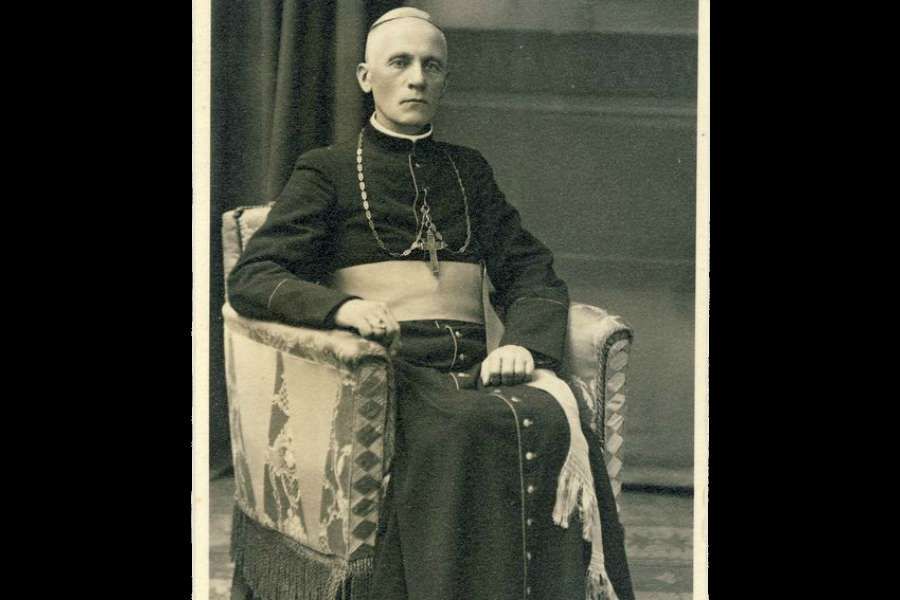Vilnius, Lithuania, Jun 13, 2017 / 03:01 am (CNA/EWTN News).- A Soviet-era priest and bishop who continually defied communist rule and spent much of his ministry in prison will be beatified later this month in Vilnius, the Lithuanian capital. Archbishop Teofilius Matulionis was declared a martyr by Pope Francis Dec. 16, clearing the way for his beatification.
Archbishop Matulionis was known for his heroism and determination in faith in the midst of the harsh atheism of the Soviet regimes which ruled the countries in which he served. Born in Kudoriškis, in what is now Lithuania, in 1873, Archbishop Matulionis was the second son of a farming family, and seemed to be drawn to the religious life from an early age.
In 1900 he was ordained a priest in what is now Belarus, where his zeal for the faith immediately raised the suspicions of the authorities of the Russian Empire, which was closely aligned with the Russian Orthodox Church. In 1909, he was sentenced by a court for baptizing a child from a mixed Orthodox and Catholic family, a sentence he served in a Dominican convent. In 1917, he witnessed the violent persecution of the Church under the Bolshevik Revolution. And in 1923, he was sentenced to three years in Moscow prisons for refusing to sign an act on the appropriation of church property and buildings.
Released a year ahead of time and allowed to return to Lithuania, the priest chose instead to go back to his parish in St. Petersburg, where he was secretly ordained a bishop in 1929. Soviet trouble never far behind, the bishop found himself in prison again in 1929, where this time he was subjected to solitary confinement, and then to hard labor and malnourishment, which took its toll on his health. He was eventually released in an exchange of prisoners between Lithuania and the Soviet Union in 1933.
Upon his release, Bishop Teofilius paid a visit to Pius XI, who praised his heroism. When Teofilius knelt down in front of the Pope, the Holy Father had the bishop stand and instead knelt down himself, saying: “You are a martyr! You must bless me first!” During the visit of a group of Lithuanian pilgrims to Rome in 1936 Pius XI again praised Bishop Teofilius: “Glory be to the Lithuanian nation that gave us a hero like him!”
In 1943 he was appointed Bishop of Kaišiadorys. While he was free, Bishop Teofilius traveled to the United States of America, Rome, the Holy Land, and the Sinai Peninsula. Afterwards he returned to Kaunas, Lithuania, where, despite Soviet and Nazi threats, the bishop spoke out boldly against the regimes, their destruction of churches, and religious persecution. This led, again, to his arrest in 1946.
Ten years later, the depleted but not defeated bishop came to Birštonas, where he secretly ordained another bishop, and was subsequently punished for his actions by being sent to Šeduva, where his communications were tapped and his room regularly searched by Soviet authorities.
In 1962, he received notice from Rome that he had been made an archbishop and that he was invited to participate in the Second Vatican Council, but he would ultimately be unable to attend. During a “search”, the archbishop was given a lethal injection under the pretense of sedatives, and died three days later, Aug. 20, 1962. He is remembered for his courage and faith despite the hardships that he endured.
During one of his many times in prison, the priest wrote: “Just think how good and merciful the Lord is: He finds His flock in the woods, in the tundra, at midnight… I am thankful to Him with all my heart! Providence made sure that we, priest brethren, be sent where the believers are. Pastors follow their flock.”
In 1957, rumors were spreading that the 84-year-old bishop would be imprisoned again, to which Bishop Matulionis responded: “If I were passing by some bushes and someone suddenly jumped in front of me and said ‘Boo’, I might be frightened… But I’m not at all scared at the idea that they can arrest and imprison me.”
Archbishop Teofilius Matulionis will be beatified in the Cathedral Square in Vilnius June 25 by Cardinal Angelo Amato, Prefect of the Congregation for the Causes of Saints.

